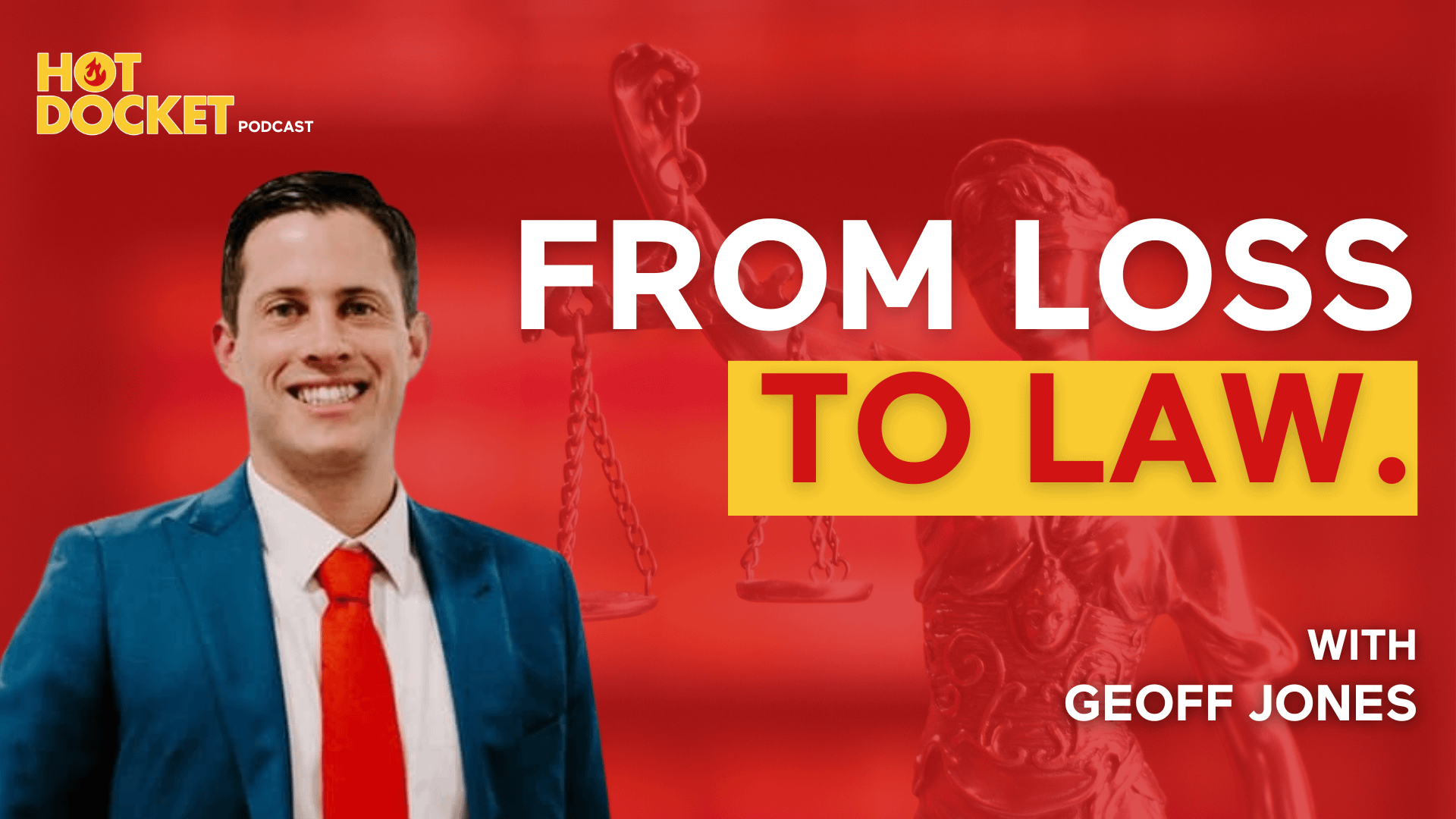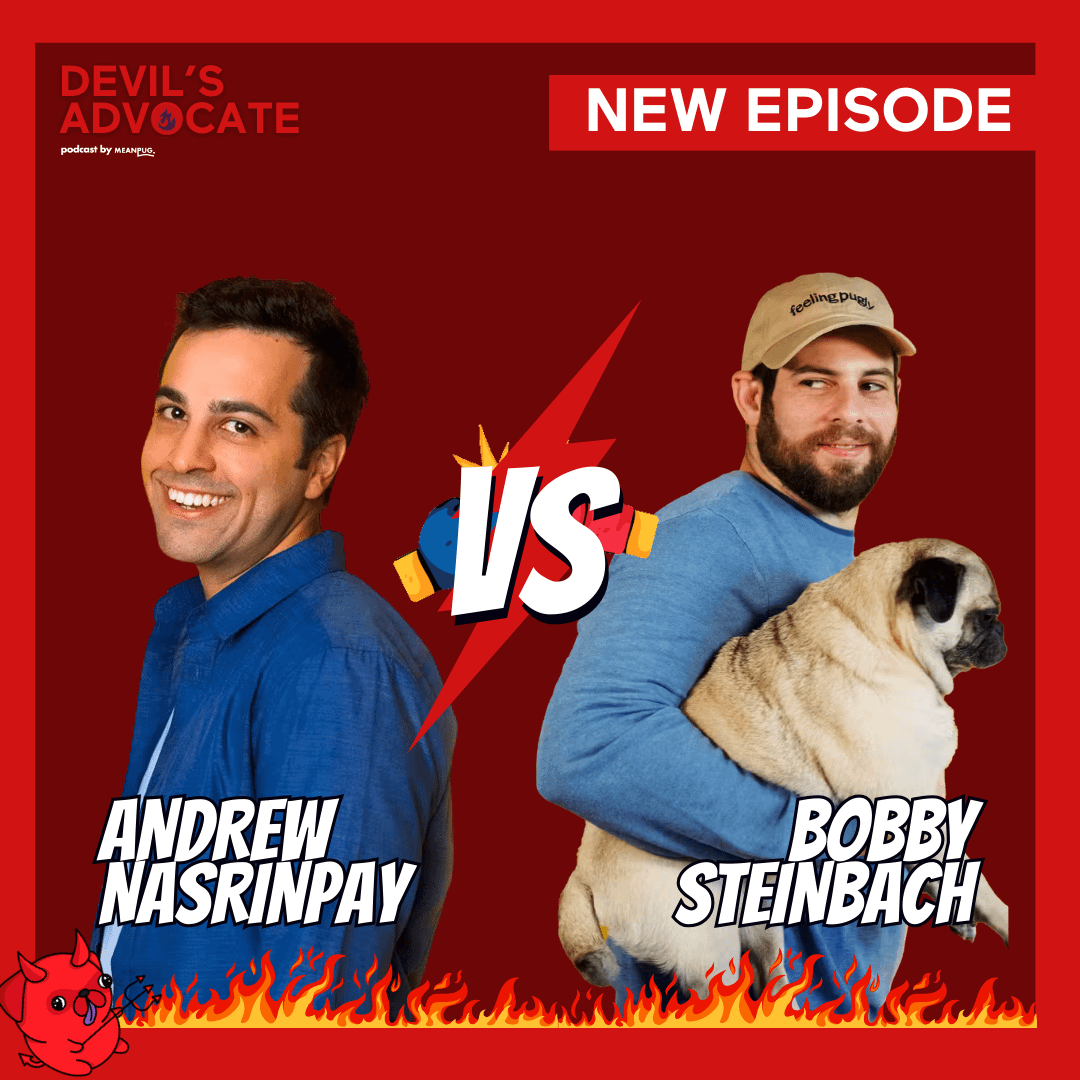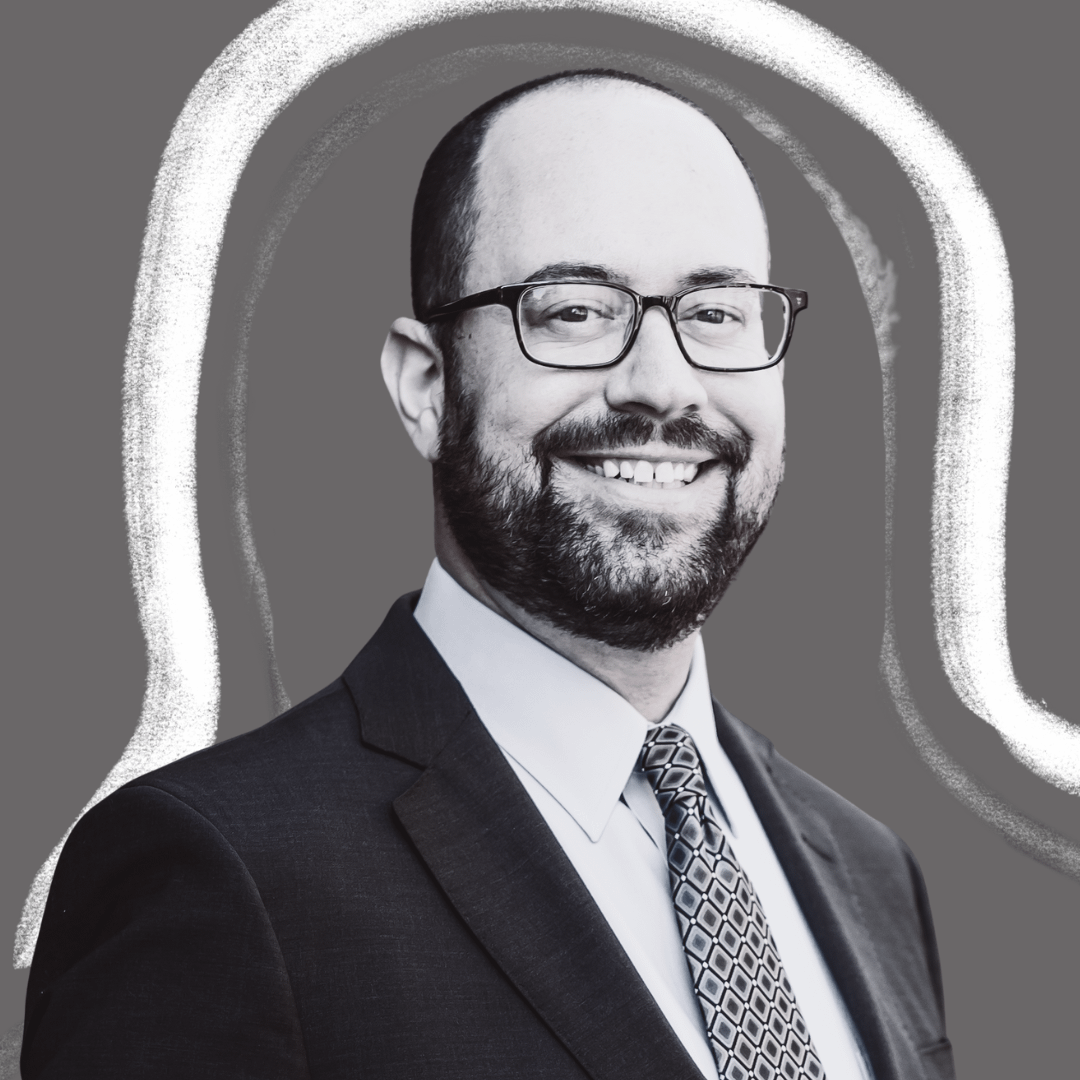
Episode Overview
- How personal loss shaped Geoff’s passion for PI law
- Why many big firms fail at client experience
- How to start and scale a values-driven firm
- The role of systems, CRMs, and AI in solo practice
- When to work a case like it’s going to trial—even if it’s not
Episode Links
Want to hear more from elite lawyers and industry-leading marketers?
Follow us on Social Media for more
Episode Topics
Key Takeaways for Law Firm Owners
- Empathy is a differentiator. Real connection matters more than branding.
- Build systems early. Structure enables scale without sacrificing service.
- Don’t assume a “small” case is low value—treat it like it’s trial-ready.
- Clients should hear from their attorney. Regular contact builds trust.
- Tech is your friend. CRMs, AI tools, and smart workflows give solos a competitive edge.
Episode Transcript
Expand Transcript

[00:00:00] Geoff Jones: What's a life worth, right? You can't ever fully compensate someone, a family member for the loss of their loved one. Money's great, but also, you know, just counseling this person, this family who's experienced this traumatic loss, knowing that they have someone who's supporting them on their side and trying to fight for them. [00:00:19] Geoff Jones: I think that's the most important aspect. [00:00:21] Bobby Steinbach: Welcome to Hot Docket, the show where we talk about winning marketing strategies that have built the most successful law firms. [00:00:27] Andrew Nasrinpay: Join us every two weeks for the latest trends and [00:00:30] tactics to grow your law firm. Welcome to the Hot Docket. Today we've got Geoff Jones from the Jones Law Firm. [00:00:37] Andrew Nasrinpay: He's an attorney that practices personal injury in [00:00:40] Columbus, Ohio.[00:00:45] [00:00:46] Andrew Nasrinpay: Thanks for joining us today, Geoff. Thanks for having me on the show. All right. [00:00:50] To kick it off, do you wanna just give us a little journey about why you became an attorney and kind of the whole story about. Uh, your career pro progression and how you got to where you are today? Sure. [00:01:03] Geoff Jones: Uh, so I became an attorney. [00:01:04] Geoff Jones: Um, you know, I think like many young people, we don't necessarily know what [00:01:10] we wanna do when we're, when our brains are still developing, when we're, you know, teenagers and, and in our early twenties. And so, um. In college, I, uh, I started out as a computer science major, uh, at a small liberal arts college here [00:01:25] in, uh, Springfield, Ohio, called Wittenberg University. [00:01:28] Geoff Jones: Uh, I immediately dropped that major [00:01:30] after two weeks because I hated, uh, uh, math and I didn't wanna [00:01:35] take a high level calculus. Uh, and then after my first year, uh, I was undeclared for three years. After my first year, I actually transferred to, um, Smaller state school in California at the time called Humboldt State University. [00:01:48] Geoff Jones: Now it's part of the Cal Poly system. So it's Cal, uh, Cal Poly, Humboldt, about 8,000 [00:01:55] kids. Um, it's in the middle of nowhere in the Redwood Forest in [00:02:00] California where there's lots of hippies and, uh, green things are grown. And actually, I, uh, so. My thinking at the time was, uh, you know, I [00:02:10] wanted to get out of Ohio for a while. [00:02:12] Geoff Jones: It was, uh, I, I wanted to experience [00:02:15] something new and different. Um, I, uh, I actually, I have [00:02:20] an identical twin brother, so, um, we both went to the same small liberal arts college, uh, after [00:02:25] high school our, our freshman year. And we, you know, it was about. I [00:02:30] think somewhere between 1,520 500 kids at the school and about a [00:02:35] dozen of them were from our high school and the school was about 50 minutes from our [00:02:40] house. [00:02:40] Geoff Jones: So it just felt, it just felt like we were still in high school, you know, at like I needed [00:02:45] to. Do something different and develop and grow and kind of figure some stuff out, uh, [00:02:50] as young people are, are want to do. Uh, and so actually I decided I wanted to be, wanted to [00:02:55] be on a coast, uh, near nature. I, uh, you know, was a, an Eagle Scout and [00:03:00] grew up hiking and camping and things of that nature, and wanted to be.[00:03:05] [00:03:05] Geoff Jones: Close to access to, to water and mountains and all that. And [00:03:10] so I was actually looking at schools on both coasts. Uh, and I decided, you know, well, [00:03:15] I was looking at who, what are, what are the cheapest state schools on both coasts? And it was UNC Wilmington at [00:03:20] the time, uh, on the East Coast and Humboldt State, uh, on the west coast. [00:03:24] Geoff Jones: I visited North Carolina. It was really hot and humid. I think it was middle of July, about a hundred degrees in. A hundred percent humidity, decided, I'm not sure I wanna be there. [00:03:35] Um, and I, I, uh, never visited Humboldt State before, [00:03:40] before orientation. I, uh, just kind of made the leap of faith and [00:03:45] accepted the, uh, admission to the school. [00:03:47] Geoff Jones: And, and I just flew out there, uh, in, in August, right before school started. And, and you get off a small plane, a small airport, um, you know, there's no. You get directly [00:04:00] off the plane and you're outside and you're surrounded by like moisture [00:04:05] and, and it's just like a whole nother universe out there. Uh, if you've seen like Return of the Jedi, I [00:04:10] think like the scenes with the, the Land Cruisers, uh, [00:04:15] in the, in with the ferns and the big trees, that's like kind of what Humboldt County looks like. [00:04:19] Geoff Jones: That's what the campus of, and the EW walks. You can't forget the little EW walks. Exactly. So it was like a whole different. Universe, uh, and, and my world really opened [00:04:30] up and, uh, had some great experiences out there. Um, it's, they call it the [00:04:35] Redwood Curtain. So it's about five hours from, uh, San [00:04:40] Francisco, I think about five hours from Portland. [00:04:42] Geoff Jones: There's just, uh, outside of the college, the town Arcata has about, I don't know, 16,000 people. Uh, and there's another. City called Eureka in Humboldt County with about [00:04:55] 20,000 people. But outside of that, there's just, there's nothing around. There's nobody around, but it's just [00:05:00] beautiful man. And, and, uh, it's an interesting place. [00:05:03] Geoff Jones: There's, uh, there's lots of hippies and then there's, if you go out into the. The real rural areas, there's lots of real [00:05:10] conservative weirdos and, uh, obviously lot. There are a lot of people that grow pot out there. [00:05:15] Um, not the reason I went, but, uh, you know, when you're in [00:05:20] college, you uh, might indulge in some of that. [00:05:23] Bobby Steinbach: Um, Geoff, one thing we talk a lot about on this podcast is authenticity and like authenticity in brand authenticity in your marketing and advertising. And one thing you immediately find when you go to your [00:05:35] site is like. Compassion and being able to put yourself in the [00:05:40] place of your clients because of something you went through in your past. [00:05:44] Bobby Steinbach: So I think it'd be really interesting to share kind of like what led you to the path of personal injury law and how can you empathize with clients at such a deep level. [00:05:55] [00:05:55] Geoff Jones: Yeah, absolutely. So, um, and I'll get into the why, uh, uh, my why for. You know why I get up every day and do this, [00:06:05] uh, and fight for people who have lost loved ones in, in motor vehicle collisions and, [00:06:10] and other incidents due to the negligence of others. [00:06:14] Geoff Jones: Um, it's not the reason why I went in, into law or into, into the personal injury field. Uh, I could tell you that story. So I actually, uh, applied to a job [00:06:25] in the Columbus Bar Association website and back in, uh, 20. [00:06:30] 13 and, um, got a call from, [00:06:35] uh, uh, a, a law firm that I knew quite well being from Columbus. Um, it's a, a big [00:06:40] advertising firm. [00:06:40] Geoff Jones: They did TV advertising and I was like, is this, this is a joke. Um, because was it elk and Elk? It wasn't elk and elk, no, it was a local Columbus firm. Um, [00:06:50] [00:06:50] Bobby Steinbach: okay. [00:06:51] Geoff Jones: Uh, but it was wild, uh, 'cause the, the, the job posting didn't disclose who the employer was or that it was a personal injury firm. And I had really [00:07:00] not given it any thought as a career. [00:07:02] Geoff Jones: Um, at the time, jobs were hard to come by. This was in 20, I graduated in 2012 and, uh, the job market wasn't great. Still from the, the Great Recession, uh, tons of people. [00:07:15] Flock to law schools to kind of avoid, uh, the job search. Um, [00:07:20] and so, you know, I thought I wanted to do corporate law or, or big law, and I'm so [00:07:25] thankful, uh, that I, uh, uh, found personal injury because it's the [00:07:30] perfect practice area for me. [00:07:32] Geoff Jones: Um, I love. Practicing in a small firm environment. I love the actually talking to clients and representing real people who have real problems rather [00:07:45] than corporations and insurance companies. Um, and, uh, [00:07:50] it's just so much more meaningful, uh, and I really appreciate the opportunity to, [00:07:55] to help regular people with. [00:07:57] Geoff Jones: When they've been seriously injured or a family member has been killed. Um, but uh, you know why I personally. For me, it's, it's even more impactful and meaningful to [00:08:10] do this type of work. Uh, uh, you'll have to go back to a terrible experience [00:08:15] that, uh, my family suffered, uh, back in, in 2008, [00:08:20] uh, when I was 21 years old about ready to start my last [00:08:25] semester of college at Humboldt State. [00:08:27] Geoff Jones: And, um. Uh, just a terrible, traumatic experience that our, our family, uh, dealt with. My, my mother, Judy, uh, she was about 54 years old at the [00:08:40] time. She was, um, really the rock of our family. Um, we [00:08:45] were, you know, there's six of us. Uh, my dad, who's, who's great. Um, I have a twin brother and, [00:08:50] and an older and a younger sister. [00:08:51] Geoff Jones: And, but my mom was really the rock of the family. She was, uh. And, and she was always a, a teacher and, uh, someone who wanted to help others. Uh, she was a substitute [00:09:05] teacher and she was a, uh, actually children's, uh, pastor at [00:09:10] our church. Um, and so she just brought a lot of light to a lot of people. And, uh, [00:09:15] unfortunately that light was, was snuffed out by a, a drunk driver. [00:09:19] Geoff Jones: Uh, my mother was killed, uh, on August 7th, 2008, and a. Drunk driving collision here in Ohio about 30 minutes from, from our house. Um, my, uh, [00:09:35] baby sister who was 17 years old at the time, uh, she was driving our family's [00:09:40] minivan. They were coming back from a college visit. Uh, my [00:09:45] sister was, uh, you know, trying to prepare, uh, and decide which college she wanted [00:09:50] to attend. [00:09:50] Geoff Jones: And they were out in Indiana, uh, visiting a, uh, small private Christian college out there. And they were headed back about 5:00 PM in the [00:10:00] middle of the day, in the summer. Beautiful day. Um, clear skies. [00:10:05] Um, and, uh, uh, they were on State Route 42 in Union [00:10:10] County, uh, which is in central Ohio, not too far from Columbus. [00:10:13] Geoff Jones: My, again, my, my sister was, was driving. And, um, they're in a section of, of the highway 50 mile. It's a 55 mile per hour zone. They're guardrails on both [00:10:25] sides. Uh, another vehicle, uh, crosses the center [00:10:30] line. It's a big SUV. The driver passed out at the [00:10:35] wheel, um, and the SUV uh, crossed all the way over and [00:10:40] hit the guardrail, um, in the lane. [00:10:42] Geoff Jones: My sister was traveling, my sister swerved to try to avoid striking the vehicle and, uh, the SUV rebounded and basically was a [00:10:55] head-on collision. Um. Just a terrible, terrible [00:11:00] tragedy. And um, you know, it's something you [00:11:05] never get over and you carry it with you for the rest of your life. Uh, I know there are lots of other people that have [00:11:10] been through, uh, similar traumatic experience. [00:11:14] Geoff Jones: Um, most people probably know someone that's gone through something like that, whether it's a, a car accident, um, or something. That's, [00:11:25] uh, a different kind of tragedy, like, like cancer. Um, the, uh, the, the [00:11:30] traumatic, um. [00:11:34] Geoff Jones: Things like, like a car wreck or, or hit you a bit different, um, because it's so sudden, um, it's, it's so difficult to know what [00:11:45] your emotions even are, how to react to it. Um, you don't have any time to [00:11:50] say goodbye. Um, in lots of cases, uh, that was the case here. Um, you [00:11:55] know, never got to say goodbye to, to our mom. [00:11:58] Geoff Jones: And, uh, I think that's. That's the worst part of experiencing something like that. Um, and so. You know, I try to use that [00:12:10] experience for, for good and I try to, um, do my [00:12:15] best to get up in the morning and help other people that are going through maybe not something at quite as [00:12:20] serious as, uh, a, a death or, or even a, you know, a, [00:12:25] a disfiguring injury. [00:12:26] Geoff Jones: But they've been involved maybe in a, um. A head-on collision or a a t-bone motor vehicle collision or a rear end collision and they're hurt. They don't know what to do. [00:12:40] Um, they don't know, uh, how their medical bills are gonna get paid or [00:12:45] how they're going to get back to work, um, to provide for their [00:12:50] family to get better. [00:12:51] Geoff Jones: They don't know what doctors to see. There's just so many unknowns and, um, I really enjoy being able to help. Those people who don't know who to turn to or what to do after they've [00:13:05] experienced a traumatic situation like this. Um, certainly, you know, if I could, [00:13:10] I would only, you know, I would focus on representing people who have similar [00:13:15] situations, uh, where it's, you know, a wrongful death case particularly, um, [00:13:20] you know, in a situation where they're. [00:13:22] Geoff Jones: There is, uh, you know, extreme disregard for human life or reckless conduct, uh, such as drunk driving or, uh, you know, reckless conduct by, uh, you know, commercial trucking companies, things of [00:13:35] that nature. Um, those cases are, uh, uh, you know, they're not [00:13:40] necessarily happening all the time every day. Um, so I do, [00:13:45] uh, I have no problem helping people who, um. [00:13:48] Geoff Jones: Or maybe less seriously injured, they'd need an attorney. Uh, in most cases, just as badly. Sometimes actually those smaller cases, it's even more beneficial to have an attorney, [00:14:00] uh, because the insurance companies really, they fight those small [00:14:05] cases just as hard as the big cases. Um, [00:14:10] and, uh, and you need somebody in your corner. [00:14:14] Bobby Steinbach: And after your family's like traumatic event, did you guys hire a personal injury lawyer or was that like the last thing that you were thinking about? [00:14:23] Geoff Jones: So a again, I was 21 years old at the time. Um, you know, my dad kind of took care of all of that stuff. I wasn't yet a lawyer or even, you know, in law school. [00:14:34] Geoff Jones: I didn't know anything about, um, personal injury law or. Really the law at all, other than, you know, reading John Grisham novel novels. [00:14:45] Um, and, um, what ended up happening and, and. [00:14:50] Unfortunately, this is all too common for drunk driving [00:14:55] collisions. Uh, of course the, the drunk driver that killed my mother had no [00:15:00] insurance whatsoever. [00:15:01] Geoff Jones: Um, and so, um, we turned to, thankfully we, we had auto insurance and we turned to our insurance company. Um, [00:15:10] but even so, you know, uh, what's a life worth, [00:15:15] right? So, um, you can't ever fully compensate. [00:15:20] Someone, a family member for the loss of their loved one. Um, we weren't, [00:15:25] certainly, weren't fully compensated. [00:15:27] Geoff Jones: Um, we, you know, we didn't have like an umbrella policy with, you know, a million or $2 million in coverage. Um, but we had [00:15:35] certainly enough to, you know, set aside some money for, uh, [00:15:40] uh, for my sister and in particular since she also. [00:15:45] Was involved in the, in physically there and, and just experienced [00:15:50] everything so much more deeply than, than the rest of us [00:15:55] did. [00:15:55] Geoff Jones: Who, um, who were there afterwards? Um, so, you know, we, I, I don't think we hired a personal injury attorney. I don't think we needed [00:16:05] to. I think the insurance company basically offered their policy limits, um, [00:16:10] because they knew it was a death case and there was clearly, uh. [00:16:15] No liability on our family's part and no [00:16:20] insurance. [00:16:20] Geoff Jones: Uh, for the other driver, they did file a, uh, an action the [00:16:25] insurance company against the other driver. Um, and so they got, you know, a default judgment [00:16:30] and, uh, the driver, she did get an Ohio at the time. The most [00:16:35] time you could get, I'm not sure if that's changed yet, was I think eight years, [00:16:40] uh, for basically vehicular. [00:16:43] Geoff Jones: Manslaughter and, uh, they actually, uh, they had a plea deal. I think she was only supposed to get five years and the judge said, no, or I'm gonna give you the maximum. [00:16:55] Um, which was, I was interesting to me that judges here. Um. [00:17:00] We'll do that. Uh, it was, you know, union County and, uh, judges are [00:17:05] tough in, in Ohio generally, and, and certainly Union County. [00:17:08] Geoff Jones: And I was thankful for that, but it, it didn't give me closure. Um, you know, I got a little bit of [00:17:15] money that, you know, didn't give me any closure either. [00:17:20] Um, and, you know, it's something we're still dealing with. So, uh, [00:17:25] to me, you know. I mean, money's [00:17:30] great. Um, uh, but also, you know, just counseling this [00:17:35] person who, this family who's experienced this traumatic loss and knowing that they have someone [00:17:40] who's supporting them and on their side and trying to fight for them, I think that's the [00:17:45] most important aspect. [00:17:46] Geoff Jones: Um. That you need to bring as a personal injury attorney, bring to the table, uh, for these people to get to know them, uh, connect [00:17:55] with them, basically treat them as a member of your family while this case is [00:18:00] ongoing, um, and do what the best you can to fight for, [00:18:05] for them and their family. [00:18:07] Bobby Steinbach: I think that's one thing Andrew and I have learned and seen firsthand is we've worked with. [00:18:14] Bobby Steinbach: Huge firms on the PI side. We've worked with small firms on the PI side, we've worked with solos on the PI side, and you've gotta play to your strength. The one thing that [00:18:25] is a common concern at the big firms, our clients feel like they're being pushed through a mill [00:18:30] and like the attorney doesn't care about their case, they care about the paycheck. [00:18:34] Bobby Steinbach: When you're with like a firm like yours that has that personal touch and you have that background and experience. Your strength is that you can connect on like an emotional and empathetic [00:18:45] level. [00:18:46] Geoff Jones: Absolutely. Um, and that's a, a big reason why I, you know, left a, a bigger firm and started my own firm, uh, you know, not only [00:19:00] for, you know, career re uh, reasons and financial reasons, but also [00:19:05] I really wanted to do a better. [00:19:07] Geoff Jones: Do it better, um, to, to really connect with people and help people, um, who've been involved in these, you know, terrible, traumatic situations. Um, [00:19:20] you know, I, I've seen it firsthand how, you know, big law firms [00:19:25] can work and some of them certainly, uh, do a better job at [00:19:30] connecting with people than others. Some firms, um, [00:19:35] they. [00:19:37] Geoff Jones: While they spend a lot of money on advertising, they kind of shoestring their budgets when it comes to providing customer service to [00:19:45] actually doing the legal work. They only care about getting the client and [00:19:50] getting, you know, trying to make a quick buck on the case. Uh, it's sad to say, but, [00:19:55] you know, I think it, it is true to some extent. [00:19:57] Geoff Jones: Um, and you know, when you have those volume firms. You, I mean, the client might never, they might go through the entire representation without [00:20:10] ever speaking to an attorney, and that to me is [00:20:15] unacceptable. Um, it's unacceptable if a client, [00:20:20] uh, you know, isn't contacted for three or four months and nothing's being done on [00:20:25] their case or they, you know. [00:20:28] Geoff Jones: They need medical treatment and they're not receiving help to get referred to a medical provider, or they're not, um, they're, uh, they need referred to a specialist [00:20:40] or get additional diagnostic work done. Um, and, and you know, [00:20:45] when you're a mill and you. Most of your cases are in [00:20:50] pre-litigation and non-attorneys are doing most of the work and all the contact with the client.[00:20:55] [00:20:55] Geoff Jones: Um, it's very easy to really, uh, cases get kind of, um, depersonalized and, uh, you know, the client becomes more of a number and it's more of a volume game and it's, you [00:21:10] know, how much money. You know, are we gonna make on average? [00:21:15] And, you know, you don't really try to fight for, for every dollar because, you know, you know, if you have [00:21:20] this many cases, you're gonna make X dollars. [00:21:23] Geoff Jones: Um, versus a smaller firm, you know, you're really trying to, uh, or you know, at least how I do it, I, I really try to, in every case, even the smallest case. [00:21:35] Really get the most value, uh, uh, that I can [00:21:40] for the client. Uh, and that's, you know, they, they need to talk to the attorney. [00:21:45] Um, the attorney needs to regularly, uh, you know, not [00:21:50] every day, but uh, regularly review the file. [00:21:53] Geoff Jones: Um, people. Non-attorneys, you know, need to follow up with the clients and regularly and make sure that they're receiving medical treatment. Um, find out, you know, whether they need [00:22:05] assistance with referrals to specialists. Um, [00:22:10] and as early on as possible, you know, you need to kind of determine whether it's a case that, [00:22:15] uh, maybe it shouldn't be a pre-litigation case. [00:22:18] Geoff Jones: Maybe it should be, uh. Worked up as a case that, uh, uh, sh you know, should be litigated. Um, and I think, um, you know, the, the distinction between pre-litigation and litigation in those [00:22:35] volume firms, um, it, they, they don't always do a great job of [00:22:40] identifying what cases should be worked up as a potential litigation [00:22:45] case. [00:22:45] Geoff Jones: Really, every case should be worked up to where it it. You can litigate the case and you need to, uh, again, try to add as much value as you can. So, [00:22:55] um, you know, for example. If someone [00:23:00] comes to you and they have, you know, neck pain or back pain, [00:23:05] um, you know, I think there's this mindset at a lot of these big firms, like, okay, if, [00:23:10] you know, if they didn't have a fracture or have surgery or. [00:23:13] Geoff Jones: Early on. Okay. It's probably just a soft tissue case. Send 'em to a chiropractor. Um, have the chiropractor treat 'em for three months and release 'em and get the records and do a demand and get the case settled as [00:23:25] quickly as possible. Um, and the reality is, you know, there are [00:23:30] so many of my clients, um, and this was true back when I worked for, [00:23:35] for a larger firm that. [00:23:38] Geoff Jones: They don't fit into that mold of this is just a regular soft tissue case. Um, there is something more going on there. They have degenerative issues that were aggravated in the accident. [00:23:50] Um, maybe they do need to get an MRI. Maybe they do need to see a surgeon. Maybe they need, [00:23:55] uh, pain management treatment. [00:23:56] Geoff Jones: Um, you know, and maybe they need. To see a doctor who can actually testify, uh, if the case goes to trial, uh, which will add a ton of value to the case if an insurance [00:24:10] company sees that, you know, yeah, this isn't just your normal soft tissue case. This person [00:24:15] has, uh, you know, some, some findings, uh, on, uh, [00:24:20] imaging. [00:24:20] Geoff Jones: They've seen a surgeon, the surgeon says, you know, they need, uh, injections or, or surgery, or, you know, they need. Regular, [00:24:30] uh, follow-ups and physical therapy, uh, into the indefinite future. [00:24:35] Um, and so, you know, I think that's where big firms a lot of times fall short is, uh, you [00:24:40] know, PI work is not cookie cutter. [00:24:43] Geoff Jones: Uh, it shouldn't be cookie cutter, uh, big firms and insurance companies. It might be easier for them, for them to make [00:24:50] cases cookie cutter. Um, but, uh, you're really doing a disservice to your [00:24:55] client and. You're, you know, [00:25:00] you're, you're not maximizing value for your firm or, or your [00:25:05] client. You're really selling everybody short. [00:25:07] Geoff Jones: Um, so yeah, I think absolutely. Uh, there are certainly some great big firms out there and there are. Amazing attorneys at that firm, uh, at those firms. Um, but I, I look up [00:25:20] to the, the solo practitioners, the small firm guys that [00:25:25] are, uh, not afraid to take on the big cases that regularly take on the big [00:25:30] cases and, you know, crush the insurance companies, uh, particularly when they're taking on [00:25:35] cases that the big firms turned away, right? [00:25:38] Geoff Jones: Because, uh, big firms all. They, they might not take on a case if there's a liability issue or if they have to do a lot of investigatory work, um, because an attorney [00:25:50] never looks at the thing, um, you know, until [00:25:55] the case has been sitting there. Um, and a case might just get turned down by a non-attorney [00:26:00] before, before you, you know, you even get started. [00:26:01] Geoff Jones: It turns out that it's a 6, 7, 8 figure case. [00:26:07] Andrew Nasrinpay: So, Geoff, I've got a question. Um. You went from a big firm to starting your own. Was there [00:26:15] anything in the, in setting up your own firm and running your own shop [00:26:20] that you found was way more difficult than you thought it would be? [00:26:25] For any of the folks listening that are thinking about starting their own shop? [00:26:28] Geoff Jones: Oh gosh. Um. It's so worth it. Um, but if I had to go back again, I, I honestly don't know that I would do it. It is, it's freaking difficult. Um, I [00:26:40] think a lot of lawyers and a lot of entrepreneurs and a lot of lawyers who [00:26:45] start their own firms, um, you know, we. We're great [00:26:50] visionaries. Um, we have lots of ideas. [00:26:53] Geoff Jones: Um, we tend to be great lawyers, but we don't know how a business works. We don't know how marketing works. Um, you know, we, if we worked for a bigger firm, you know, we don't [00:27:05] see how so much of the sausage is made. Um, and [00:27:10] so it's, uh, it's certainly there are so [00:27:15] many unforeseen, um. Mountains that you don't, you don't [00:27:20] even think about or see. [00:27:21] Geoff Jones: Um, and so, you know, I I, it was just kind of the perfect timing for me. Uh, I was six years into, uh, my practice [00:27:30] and I just, I wasn't. Wasn't, I wasn't on the path to where [00:27:35] I wanted to be and I knew I needed to change. Um, and, uh, at the [00:27:40] time my, uh, my grandma recently passed away. I got a little bit of money through her [00:27:45] estate, so I had a little bit of, um, you know, financial room.[00:27:50] [00:27:50] Geoff Jones: Um, that's huge. You need some kind of. Savings or a spouse to support you to, to start your firm? Um, I had, uh, uh, my current spouse, uh, I was with her and we, uh, moved in [00:28:05] together. She bought a house and she was a pharmacist making a good income. So, [00:28:10] um, she was a huge support for me and she still is. Um, without her, [00:28:15] I don't think I could have, could have made the leap and, and, and done this, [00:28:20] um. [00:28:21] Geoff Jones: But, you know, uh, I kind of just took it one step at a time. So it was like, uh, you know, let's, let's, let's, uh, create the [00:28:30] LLC today. Let's, uh, um, you know, look at what, [00:28:35] what do I need? Equipment wise, computers, that kind of thing. [00:28:40] Um, I didn't really, I did develop a business plan, um, [00:28:45] but it was, it was pretty basic. [00:28:46] Geoff Jones: You know, I didn't think everything through, it was a lot of learning on the fly. It still is a lot of learning on the fly. Um, but what I do bring to the table and I [00:28:55] think, um. Again, lots of [00:29:00] solos and small firms are great at this is, you know, we [00:29:05] are great innovators. We are great at using technology and [00:29:10] um. [00:29:11] Geoff Jones: In just making things better, improving, uh, processes and systems and documenting how you do things. And it's, for me, it's not just, let's do it the way we did at the old firm. Let's do it the way, you know, lawyers have been doing [00:29:25] it for 30 years. 'cause I saw that it, yeah, it works to some extent, but [00:29:30] again, you're not being efficient, you're not doing the best. [00:29:34] Geoff Jones: Service for your client, you're not maximizing value for your cases. Uh, my, the, uh, attorney who owned the firm that I worked at, he didn't even know, uh, know how to use email. [00:29:45] Believe it or not. We, we still kept, I believe it. This was [00:29:50] 2019 when I left. They still didn't have any, uh, they weren't [00:29:55] scanning in, uh, they were still getting. [00:29:57] Geoff Jones: Medical records through the mail, um, and had paper files that would sometimes disappear and you couldn't find them. Literally files would, you couldn't find 'em for like three months and they'd turn up somewhere else and it's [00:30:10] like, come on guys. There's a, there's an easy way to, to. To do [00:30:15] this, um, we can get rid of a lot of paper. [00:30:17] Geoff Jones: We can make sure we don't ever lose anything. We can make sure, you know, the client can have access to this information as well through a portal. Like [00:30:25] get, get with the, the 21st century. You know, it's 2019 now, it's [00:30:30] 2025, and we've got AI and all these great tools that make it [00:30:35] so much easier for your solo and small firm. [00:30:37] Geoff Jones: You don't have to hire, um, you know. A receptionist full-time, you can use smith.ai or you know, one of these other, um, virtual receptionist services. You can, uh, [00:30:50] hire VAs overseas to do work for you. Um, the problem with that is you have to have [00:30:55] systems in place and have somebody to train the VAs. Um, but all these, all [00:31:00] these tools at your disposal that just make. [00:31:04] Geoff Jones: The, uh, uh, growth. So much easier scaling, so much easier. Um, uh, it makes your practice so much more efficient to use things like CRMs, like obviously case management software, which, you know, even [00:31:20] my old firm had case management software, right? Um, but if you're not [00:31:25] utilizing some of these newer things, it's mind-boggling. [00:31:29] Geoff Jones: You know what? I can't keep up with it. I don't, and I don't think most law firms are gonna be able to keep up with these technological changes. Um, I mean, chat GPT [00:31:40] for example, every day I use it, it seems like it's smarter and smarter. It's wild. [00:31:45] Um, and I think, um, it's a great time to be an [00:31:50] entrepreneur and to, to start your own law firm. [00:31:53] Geoff Jones: Um, and, uh, it's okay to learn things as you go and, um. You know, it's, it's rewarding and it's, uh, it's, it's been a, a great ride and, uh, [00:32:05] six years into it now I'm looking to move. I'm, uh, having a build out going [00:32:10] on. I'm looking to move out into a bigger space. I'm trying to hire more people [00:32:15] and, you know, spend more money to bring more in, more cases and help more [00:32:20] people. [00:32:20] Geoff Jones: And I am, you know, exactly where I want to be. Um, it's been really rewarding. [00:32:27] Bobby Steinbach: Amazing. I think this is probably a good, uh, place to, uh, put a pin in it for now. Yeah. Um, thanks again for hopping on Geoff. Yeah, absolutely. This was a great conversation. I think you got a really interesting [00:32:40] story. What got you here, what you're doing now? [00:32:43] Bobby Steinbach: Um, what. More solos in the world, all for it. Um, you can find Geoff, if you're injured in Columbus, I guess, uh, go to the Jones firm and, um, [00:32:55] otherwise we'll put all his information in the show notes so folks can check you out. See [00:33:00] you on the next Hot Docket. We hope you've enjoyed this episode of Hot Docket. [00:33:03] Bobby Steinbach: We're your hosts, Bobby and Andrew,founders of Meme Pug, the marketing agency for ambitious law firms. [00:33:08] Andrew Nasrinpay: Have questions about marketing or anything we covered today? Email us at bark@meanpug.com. [00:33:15] Be sure to subscribe to learn more. Until next time.










